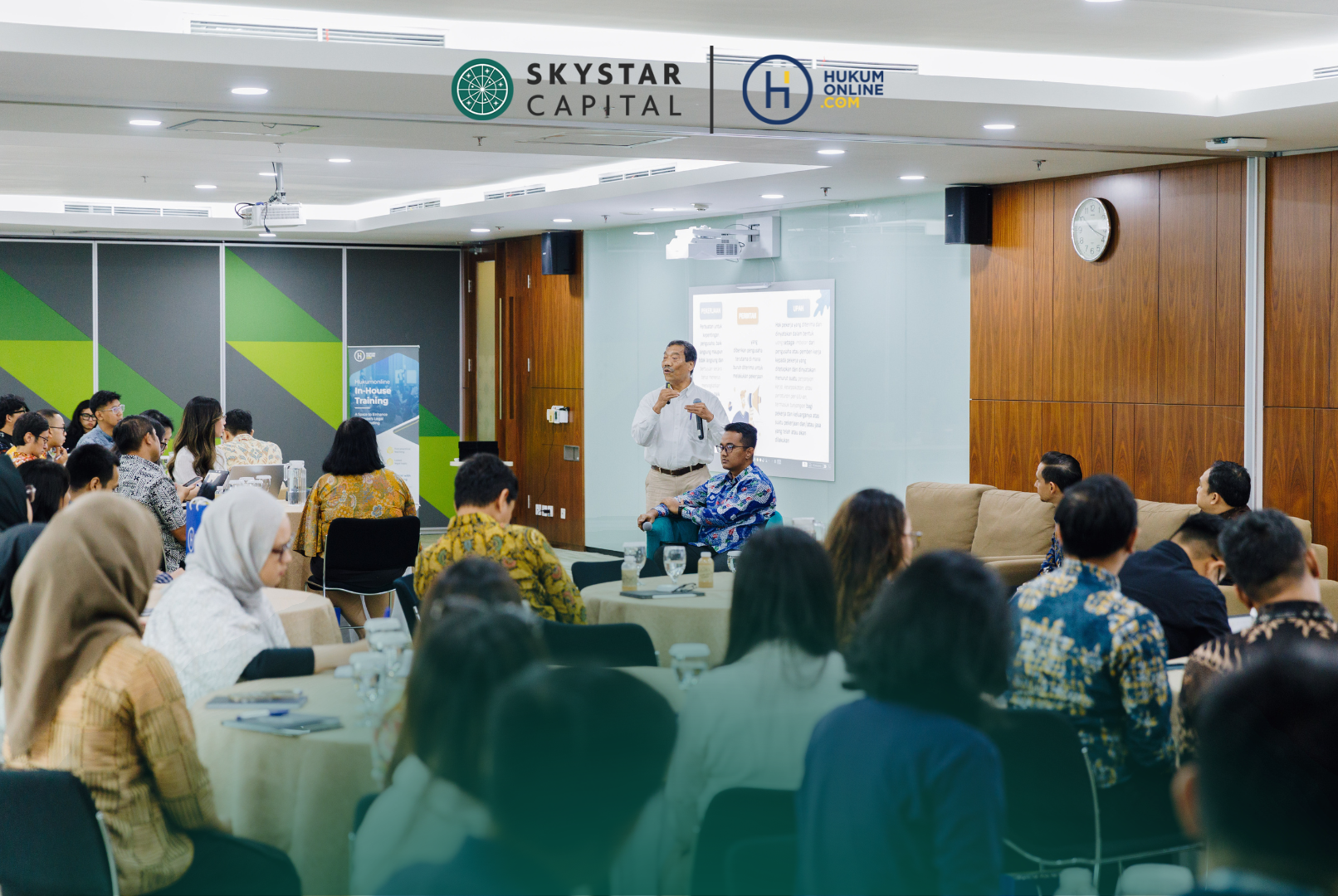Since its enactment, Law No. 6 of 2023 on Cipta Kerja (UU Cipta Kerja) has sparked diverse reactions from the public, particularly from workers and business owners. On one hand, the law is seen as a solution to create more job opportunities and facilitate ease of doing business. However, many argue that the Cipta Kerja Law introduces new challenges, especially regarding workers’ rights. The complexity of the regulations and sudden changes raise the question: does this law genuinely simplify or complicate the labor sector?
The numerous regulatory changes have left many companies struggling to adapt to the new rules. Uncertainty around workers’ rights, termination of employment (PHK), and foreign worker (TKA) regulations are key concerns. In response to this ongoing debate, Skystar Capital, in collaboration with Hukumonline, hosted a Legal Sharing session titled “Implications of Law No. 6 of 2023 on Cipta Kerja for Employment in Indonesia” on Wednesday, October 2, 2024.
The legal experts in this discussion aimed to provide a deep understanding of the implications of the Cipta Kerja Law on employment in Indonesia to more than 40 participants from various companies, including University of Multimedia Nusantara, Kompas Gramedia, Santika Hotels Group, Samator Indo Gas, Tbk., Maka Motors, Rekosistem, and BASE.
Changes in Employment Post Cipta Kerja Law
Sahat Sinurat, Director and Senior Instructor at the Ministry of Manpower, explained that the main goal of the Cipta Kerja Law is to create jobs and support the growth of MSMEs. “This law is designed to facilitate MSMEs growing into larger businesses, creating a more dynamic business ecosystem,” he stated.
He also emphasized the importance of workers’ freedom in utilizing their wages. “Wages must be paid in cash, not in vouchers restricted to certain vendors. This practice infringes on workers’ freedom to decide how they meet their own needs,” Sahat added.
Challenges in Protecting Workers’ Rights
Stephen Igor Warokka, Partner at SSEK Law Firm, highlighted the difficulties companies face in aligning internal regulations with the new provisions.
“Many companies have not yet adjusted their internal rules, which may violate workers’ rights.”
Stephen also pointed out the restrictions on foreign workers (TKA), with a two-year limit on work permits and separate licenses required for working within the same group of companies. He further stressed the importance of complying with severance pay obligations outlined in employment contracts. “Failure to meet these obligations can lead to disputes, weakening the company’s position in legal proceedings,” he warned.
Dispute Resolution Mechanisms
Indrawan Dwi Yuriutomo, Associate at SSEK Law Firm, underlined the importance of bipartite negotiations (discussions between workers and employers) as a first step before escalating issues to the Ministry of Manpower or the Industrial Relations Court (PHI). “This allows both parties to engage in dialogue without resorting to legal action,” he explained.
However, if bipartite negotiations fail, disputes can escalate, becoming more complex and costly, especially if they proceed to mediation or arbitration. Ultimately, resolving labor issues requires a proactive approach from both parties to avoid prolonged disputes and greater financial losses, which could even lead to criminal consequences.
Implications of the Cipta Kerja Law for Startups
For the fast-moving startup sector, the Cipta Kerja Law presents both challenges and opportunities. One advantage is the flexibility to hire talent through fixed-term employment agreements (PKWT). However, the five-year limit on PKWT contracts and stricter termination (PHK) rules mean startups must exercise caution when drafting employment agreements.
The law also streamlines licensing and investment processes, which startups can leverage for accelerated growth. It is crucial for startups to fully understand this new regulation to seize growth opportunities while staying compliant with legal requirements.
Although the Cipta Kerja Law offers ease in doing business, the significant changes to labor regulations also bring challenges. A deep understanding and quick adaptation are crucial to ensure the law delivers the expected benefits.
As stated by Arkka Dhiratara, CEO of Hukumonline.com, “We hope that this session provides broader insights into the norms of the Cipta Kerja law, enabling better decision-making that aligns with current regulations.”
Meanwhile, Head of Communication at Skystar Capital, Sulyana Andikko, added, “With this event, the attending companies can implement the Cipta Kerja regulations appropriately while prioritizing a humanistic approach.” she remarked.
Submit your business proposal here and become part of the growing startup ecosystem with us! We are ready to be your earliest backers.








